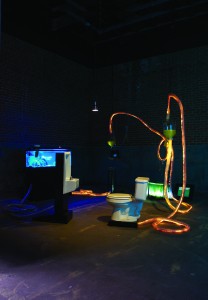Drink.Pee.Drink.Pee.Drink.Pee

Britta Riley, Rebecca Bray
http://www.submersibledesign.com/drinkpee/
The project “Drink.Pee.Drink.Pee.Drink.Pee” reconsiders urine as a rich source of nutrients instead of a waste product. The Urine Fertilizer Lab transforms your urine into fertilizer for your houseplants, removing elements that are toxic to the waterways where your urine ends up. Participants pee in a jar, learn about urine and its role in the water cycle, perform a multi-stage reaction, and walk away with a dry fertilizer derived from their own bodies.
The project was born of the question: how might we thoughtfully and actively participate in our ecosystems and better manage the impact of human presence on the planet?
Human urine traverses ecosystems. When we flush our pee down the toilet, its powerfully concentrated nutrients pollute aquatic ecosystems. Because urine is not fully treated by current sewage treatment plants, excess nitrogen and phosphorus in human urine cause suffocating algae overgrowth in waterways. Our medications can cause sterility or mutation in other life forms. Traces of human medicines remain in the bodies of water from which we all eventually drink.
However, this liquid by-product of our daily lives need not be a pollutant. Urine can be a rich food source if it gets into the RIGHT part of the right ecosystem.
The way we deal with our urine across the globe exemplifies unnatural management. The latest innovations in environmentally responsible sewage treatment attempt to recycle nutrients back to fertilizer. However, like most attempts to mass-manage the ecosystem, the sheer size of the project creates its own problems. Mass solutions involve long-distance pathways, huge volumes of man-made material infrastructure, and vast amounts of energy.
Potentially what lies ahead is a softening and dispersal, a naturalization of agency in which we evolve away from centralized mass-management of ecosystems. Instead of sending our pee through miles of new pipes and then buying fertilized food grown from pee-derived fertilizer, we might recycle our urine for our own houseplants, shrinking the sprawl of the nutrient exchange to a size appropriate for our own sphere of responsibility. The “Drink.Pee.Drink.Pee.Drink.Pee” project asks participants to look at their own urine as something beyond waste, and instead as a potentially rich nutrient that can be thoughtfully managed in their own ecosystems.
Perhaps we can evolve from passive supporters of centralized mass-management into a network of sentient ecosystems. If put into the hands of the masses, future innovations in technologies such as nanotechnology, biochemistry and sensing might allow us all to better convert materials within our immediate surroundings, rather than simply consuming and then disposing of them. We can be more active humans at the center of our own microenvironments, enthusiastically brokering ever-new opportunities for exchanges of hyper-local organic materials and intelligently managing our own role in continuous natural cycles.
Workshops (limited for twelve participants):
Thu 3.9. 13:00 – 14:30 and 15:00 – 16:30
Fri 4.9. 13:00 – 14:30 and 15:00 – 16:30
Sat 5.9. 13:00 – 14:30 and 15:00 – 16:30
Sun 6.9. 13:00 – 14:30 and 15:00 – 16:30
Mon 7.9. 13:00 – 14:30

I did a little interview with these amazing folks here:
http://www.theworld.org/2009/09/04/recreating-pre-war-nagasaki-in-3d-ars-electronica-2009-and-a-brief-history-of-gps-drawing/